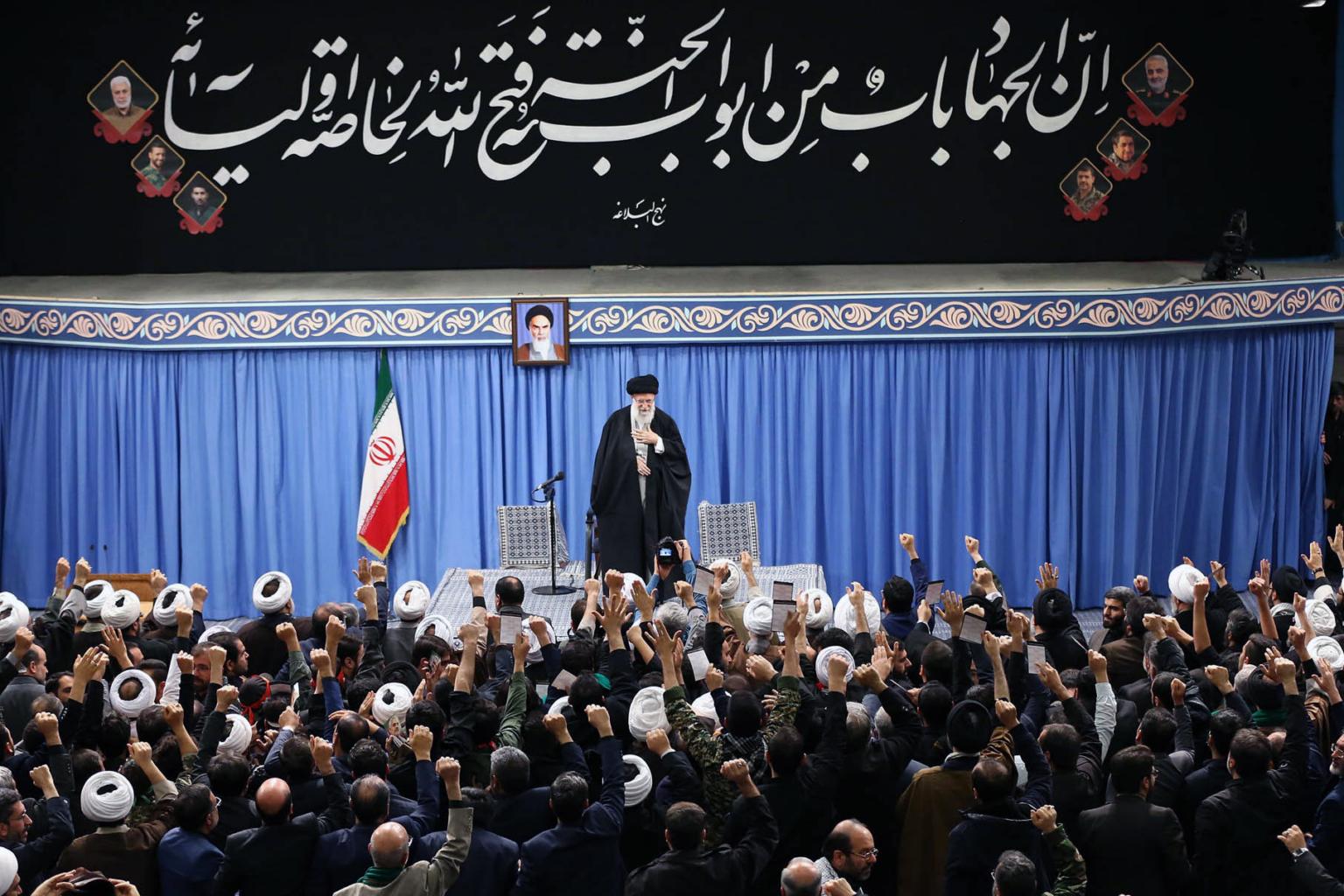Iran's missiles have done little damage, but it has more potent, unconventional weapons
Sign up now: Get ST's newsletters delivered to your inbox

Iran's Supreme Leader Ayatollah Ali Khamenei addressing a meeting in Teheran, on Jan 8, 2020.
PHOTO: NYTIMES
Follow topic:
NEW YORK (NYTIMES) - United States military and intelligence officials were stunned at the precision, scale and sheer boldness of what they later concluded was an Iranian attack.
Four months ago, a swarm of low-flying armed drones and cruise missiles struck oil tanks in the central hub of the Saudi petroleum industry, catching Washington by surprise and temporarily knocking out 5 per cent of the world's oil supply. Almost no country in the region - except, perhaps, Israel - could have defended against it.
The Iranian attack on US military posts in Iraq early on Wednesday (Jan 8), local time - the only direct attack on the US or its allies claimed by Iran since the seizure of the US Embassy in 1979 - relied on ballistic missiles and inflicted little damage.
But with tensions between the US and Iran at the highest level in four decades, the unexpected success of the September strike on the Saudi oil facilities is a stark reminder that Teheran has an array of stealthier weapons in its arsenal that could pose far greater threats if the hostilities escalate.
Iran has denied responsibility for the Saudi attack. But US officials have concluded Iran was behind it, by sending the drones and missiles from Iran or southern Iraq.
Iran's conventional military has deteriorated severely during the country's relative isolation since the Islamic Revolution of 1979. But Teheran has spent those decades cultivating less conventional capabilities that are now among the most potent in the world and which are ideally suited for carrying out asymmetrical warfare against a superpower like the US.
Iran commands the region's largest arsenal of ballistic and cruise missiles, a network of allied militant groups around the region with as many as 250,000 fighters, and teams of computer hackers that American officials rank among the most dangerous.
It has also developed sophisticated armed and surveillance drones. And lacking a strong conventional navy, it has sought other ways to choke off the flow of Persian Gulf oil, with a fleet of small speedboats and a stockpile of underwater mines.
"Their offensive capability is drastically greater than the defensive capability that is arrayed against them," said Mr Jack Watling, an analyst at the Royal United Services Institute, a London security research centre. "Their ability to inflict significant damage makes the cost of war with Iran quite severe."
The ineffectual attack on Wednesday demonstrated the range of Iran's ballistic missiles - some travelling more than 1,000km - but also their poor accuracy, with several landing well outside their presumed targets. Some analysts suggested that Iran's supreme leader, Ayatollah Ali Khamenei, may have intentionally ordered a symbolic but relatively harmless attack to show Iranian citizens a forceful response without provoking an all-out war with Washington.
"Khamenei has to calibrate the response so that it is enough for Iran not to lose face but not so much that Iran loses its head," said Mr Karim Sadjadpour, a scholar of Iran at the Carnegie Endowment for International Peace.
But Teheran and its allies may still be plotting less overt forms of revenge for the American killing last week of Iranian military commander Qassem Soleimani. Many analysts contend that Iran and its militant allies are reverting to their pattern of covert or indirect attacks that leave no clear evidence of Iranian responsibility.
Iranian-backed militias in Iraq, who also lost one of their leaders in the drone strike that killed Major-General Soleimani, said on Wednesday that they would seek their own revenge. Mr Hassan Nasrallah, leader of Iranian-backed Lebanese militia Hizbollah, has said that it would do so as well.
Iran has also shown a longstanding interest in assassinations, a tactic that could match the vows of Iranian officials to take "proportionate" measures to avenge Maj-Gen Soleimani. Several Iran experts said that killing an American official, presumably in the region, might be the eye-for-an-eye that Teheran is seeking.
"I certainly would not be going out to many public places because the risk of getting whacked or kidnapped is very high," said Sir John Jenkins, a former British ambassador in Saudi Arabia.


